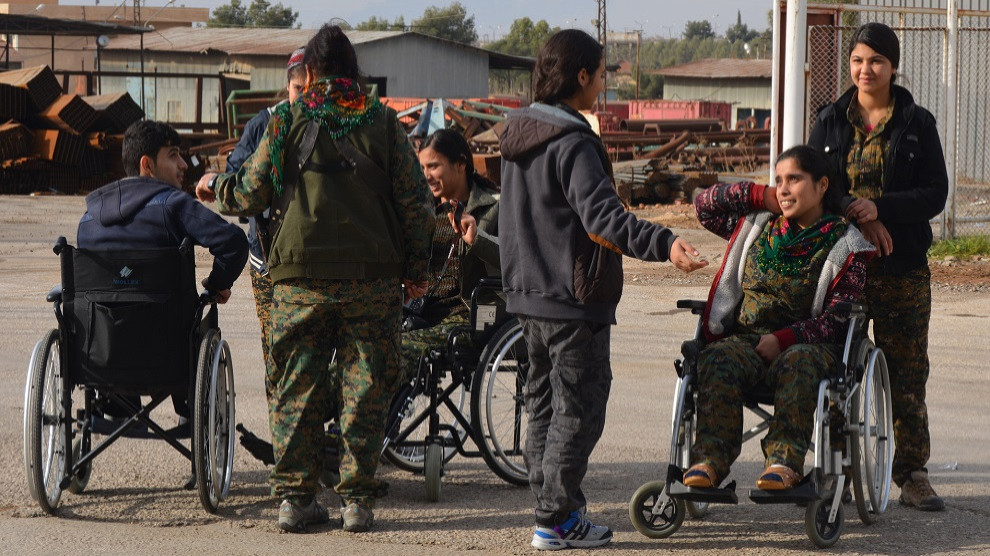Call from an internationalist physiotherapist in Rojava
An internationalist physiotherapist describes his work with war-wounded in Rojava and the great need for skilled personnel and health aids.
An internationalist physiotherapist describes his work with war-wounded in Rojava and the great need for skilled personnel and health aids.

With the beginning of the invasion war of Turkey, which is contrary to international law, I travelled to Northeast Syria as an internationalist with a physiotherapeutic background. Here I am currently working as a physiotherapist in a "House of the War-Wounded" in Rojava. In total there are about 2500 of them in Northeast Syria. The number of wounded is difficult to estimate, the need for physiotherapeutic care is immense and the working conditions as well as the medical care with aids are difficult.
The "Mala Gazî", the "houses of the war-wounded", are facilities of Rojava's autonomous and self-governing structures. They provide shelter, care and rehabilitation for the countless war-wounded. The inhabitants are courageous women and men of the YPJ and YPG defence units who risked their lives in the struggle for freedom, equality and social ecology and were wounded in the process.
These heroes have not only been fighting for years against the ongoing genocide attempt of the Turkish AKP government under Erdoğan, but also against the constant attacks and the desired caliphate by allied proxy militias of Islamist terrorists like the Daesh (Islamic state) and al-Qaida. In talks with the war-wounded it quickly becomes clear that the Kurdish population is not interested in power, wealth or the proclamation of its own state. They merely demand recognition and clearly voice that they are part of the Syrian state.
Worldwide there are about 40 million Kurds who, in 1916, under the Sykes Picot Agreement, were divided between Turkey, Iran, Iraq and Syria and thus became a political minority themselves. History is filled with genocidal catastrophes that have led to today's situation, such as the persecution of the Yazidis or the poison gas attacks by Dersim in 1938/39.
The current war of aggression of Turkey represents a particularly black mark in the history of world politics. Turkey's membership in NATO, the trade agreements with Europe and the current political decisions of the USA, Russia and the European Union not only do not stop but actively support this war.
Acute shortage of skilled workers and aids
In the daily work with my patients, various problems arise which are very difficult to solve due to the current situation. There is an acute shortage of specialists. The relationship between therapists and patients is immense and the few therapists work in long and hard shifts at different locations. The shortage of specialists is further increased by the sometimes long travel times.
The training of local therapists does not meet international standards and the acquired knowledge is based almost exclusively on biomechanical-structural thinking, i.e. from the beginnings of physiotherapy in the 1970s. Especially in the fields of neurology, physiology and cognitive therapy there are clear gaps in education. The basic anatomical knowledge seems rudimentary. This is partly due to a serious lack of teaching materials in Kurdish and Arabic.
The majority of local patients suffer from gunshot wounds that have affected the spine, spinal cord or peripheral nerves in any way. Gunshot wounds in the area of the head are also common, with cognitively limiting consequences. So, the most common clinical symptoms to be treated are tetraplegia and hemiparesis with all known side effects such as spasticity, contractures and coordinative restrictions. Peripheral nerve lesions and amputations with sequelae are also strongly represented.
Another problem is the inadequate medical care of the patients with aids, but also with therapy material for the therapists. In principle, everything that is no longer needed in Europe and the USA ends up here. This also applies to prosthetic care. In Qamishlo and Hesekê there is the possibility to measure limbs. However, the prostheses themselves are often inadequately adapted and not up to date in terms of technical and professional possibilities. Here, too, there is a lack of qualified personnel. Financial aspects and the supply of new material also have a great influence on this process.
The journey is worth it
Rojava is an unprecedented model of life, unique in the world: a multi-ethnic and secular community, based on democracy, equality and social ecology, which for more than eight years has stabilized a crucible of political mistakes in the Middle East, giving people freedom, security and self-government. Now Rojava is threatened and experiences a humanitarian and ecological catastrophe.
The possibilities to help are manifold. Times are difficult and war is raging. But right now it is worth coming here, not only to help actively, but also to learn what a self-determined and free life feels like. As an internationalist on the ground, I can only advise you not to be deterred by the news. I feel safe and not afraid, many areas are still safe. There is a great need for physiotherapists and occupational therapists, nurses, speech therapists, orthopedic technicians and doctors on site.
But there is also an opportunity from Europe to actively fight for democracy, equality and environmental protection. For example, translators are urgently needed who can translate medical training material from English or German into Arabic, Kurdish or Turkish.
I would like to motivate everyone to come here, to contribute their own skills and to experience what it is like to live in a self-governing society. Solidary greetings from Rojava!